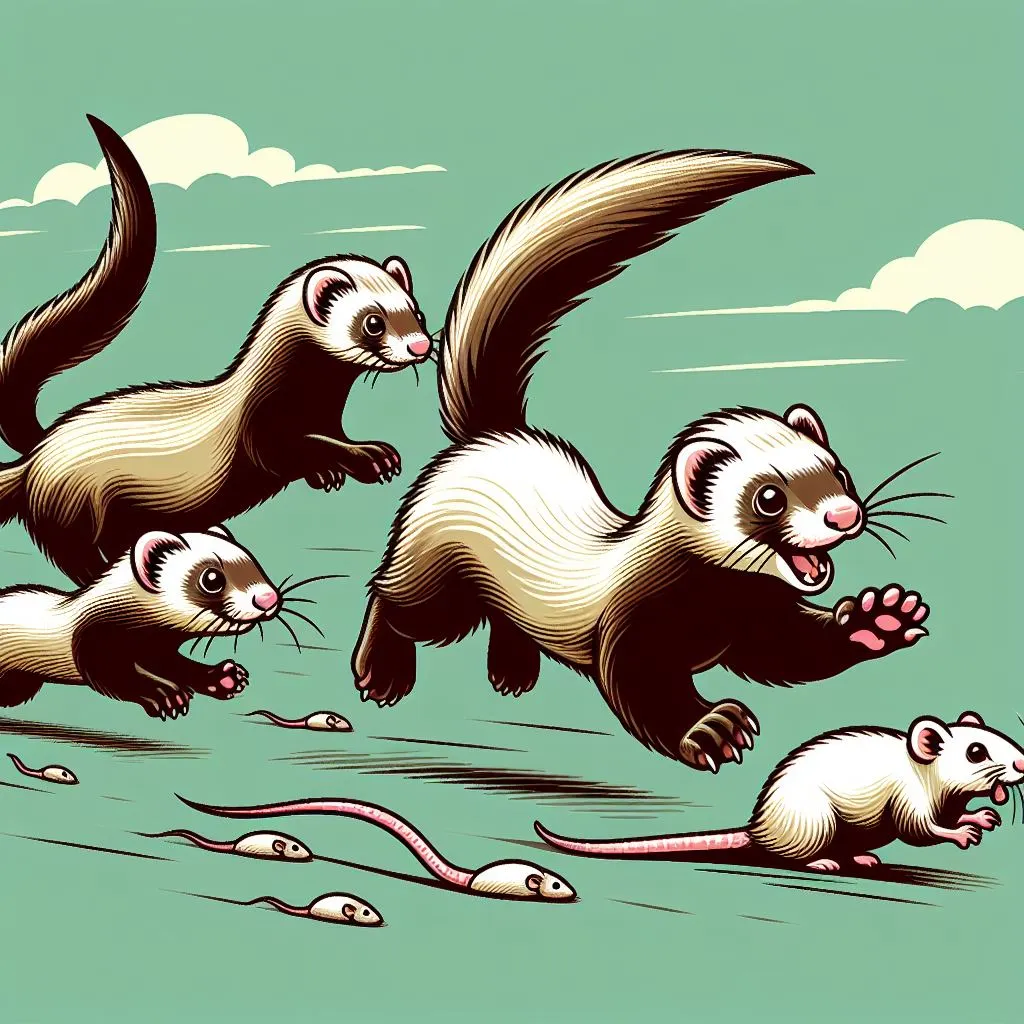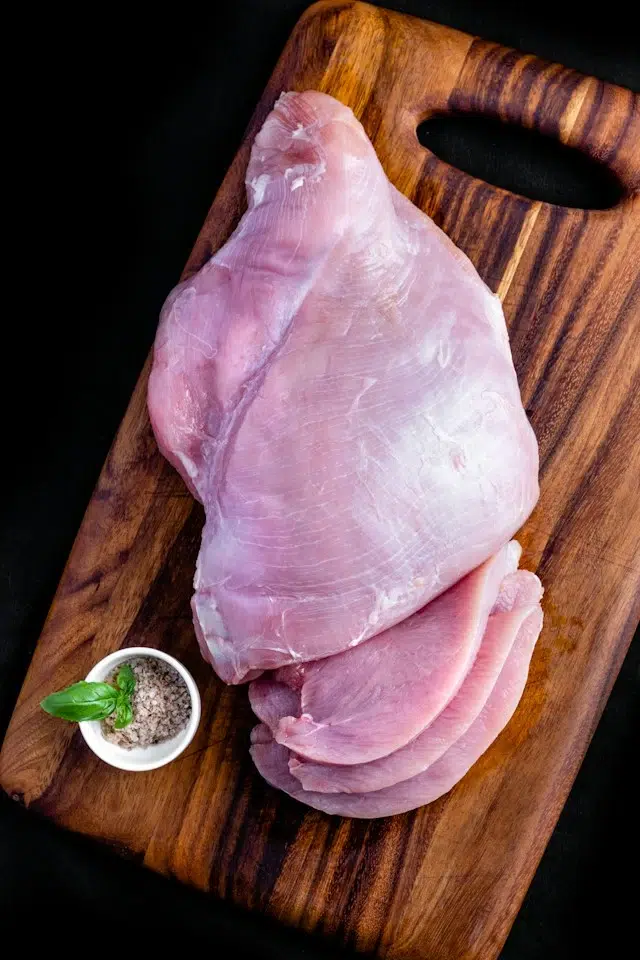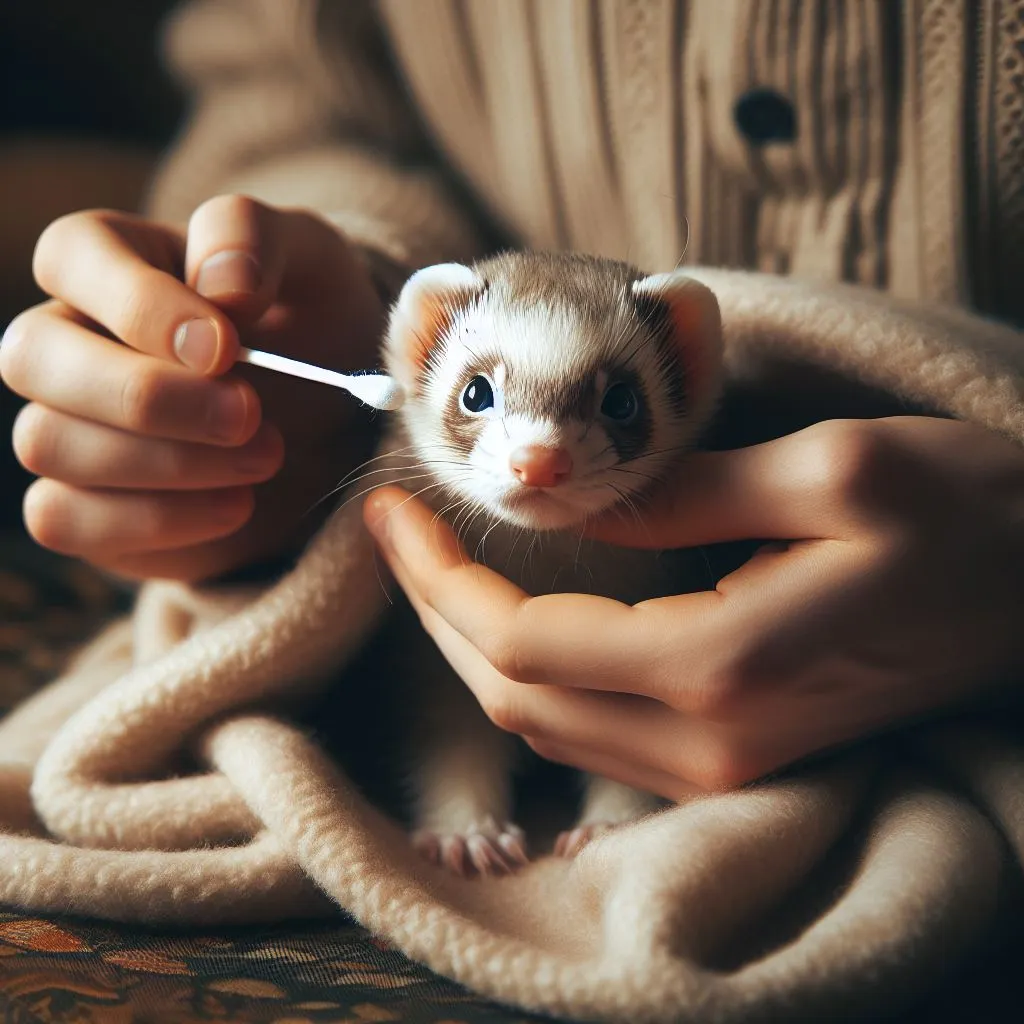Do Ferrets Eat Mice? Understanding Their Natural Diet

Curious about whether ferrets eat mice? This blog post delves into the intriguing question, exploring the dietary habits of these fascinating pets. Discover insights on ferrets’ natural instincts, nutritional needs, and potential behaviors when encountering mice.
Uncover valuable tips for ferret owners and enthusiasts who want to understand more about their pets’ eating habits and how to ensure their well-being. Get ready to unravel the mysteries surrounding this topic!
Key Takeaways
- Yes, Ferrets can eat mice as ferrets have been eating it in the wild and it provides the necessary nutrients required for a ferret such as high-protein, high-fat, low carbs, low fiber.
- Ferrets are carnivores and have a natural instinct to eat meat, including mice, as part of their diet.
- When changing your ferret’s diet, do it gradually by mixing new foods with the old to prevent digestive issues.
- Consider adding supplements like taurine to your ferret’s diet to ensure they receive essential nutrients for their well-being.
- Offer high-protein, grain-free ferret food and occasional treats like cooked eggs or small amounts of fruits for a balanced diet.
- Avoid feeding your ferret foods like chocolate, caffeine, dairy, and excessive carbohydrates, as they can be harmful to their health.
- Provide mental stimulation through enrichment activities and establish a consistent feeding schedule to promote your ferret’s overall health and well-being.
Topics Covered In This Article
- Understanding Ferrets’ Natural Diet
- The Role of Live Prey in a Ferret’s Diet
- Transitioning Your Ferret’s Diet Safely
- Supplemental Nutrition for Optimal Health
- Ideal Food Choices and Treats for Ferrets
- Foods and Substances Harmful to Ferrets
- Enrichment Activities and Feeding Schedule
- Summary
- Frequently Asked Questions
Understanding Ferrets’ Natural Diet
Ferrets’ Natural Diet

Ferrets are obligate carnivores, meaning their diet should mainly consist of meat. Their natural food is high in protein and fat, providing essential energy for their well-being. A balanced ferret diet includes High-Quality Animal Protein (30-40% of the total), Fat (15-25%, up to 30% for pregnant ferrets), and Low Fiber content (less than 3%).
In the wild, ferrets rely on hunting small prey like mice and rabbits to meet their dietary requirements. This behavior stems from their instincts as hunters and predators. By consuming these animals, they obtain crucial nutrients necessary for their growth and development.
Additional Nutritional Needs Of Ferrets
Ferrets need specific nutrients such as taurine, omega-3 fatty acids, and vitamins to maintain optimal health. Taurine is vital for heart function, vision health, and overall well-being in ferrets. Omega-3 fatty acids support brain development and a healthy coat while vitamins play a role in various bodily functions.
Pros:
- High protein/fat content supports energy needs.
- Mimics natural hunting behaviors.
Cons:
- Need careful monitoring to avoid overfeeding.
- Potential risk if fed inappropriate foods.
The Role of Live Prey in a Ferret’s Diet
Mental Stimulation and Exercise
Feeding ferrets live prey like adult mice can provide mental stimulation and serve as a form of exercise. This mimics the natural hunting behavior that ferrets exhibit in the wild. When ferrets hunt for their food, it engages them mentally and physically, keeping them active and entertained.
Live prey allows ferrets to engage in activities that stimulate their senses, promoting overall well-being. By introducing live prey into a ferret’s diet, owners can help prevent boredom and encourage the natural behaviors of these obligate carnivores. Watching a ferret stalk, capture, and consume its prey can be enriching for both the pet and the owner.
Alternative Options Available
While feeding live prey has its benefits, it is not necessary for meeting a ferret’s nutritional needs. There are alternative options such as providing raw meat, high-quality commercial ferret food, or even specially formulated diets rich in animal proteins like fish or poultry. These alternatives ensure that your pet receives all the essential nutrients without having to feed on live animals.
Transitioning Your Ferret’s Diet Safely
Gradual Transition
When transitioning your ferret’s diet, make sure to do it slowly over a few weeks. Begin by mixing small amounts of the new food with the old one. Increase the transition gradually to give your ferret’s digestive system time to adjust.
It is essential to monitor how your ferret responds to the new diet throughout this process. By observing any changes in behavior or appetite, you can ensure a smooth transition without causing any stress or health issues for your pet.
Consultation with Veterinarian
If you encounter any problems during the diet transition period, seek advice from a veterinarian promptly. A professional can provide guidance on how to proceed and address any concerns that may arise during this rodentpro changeover.
- Start by mixing small amounts of new food
- Gradually increase proportion of new food
- Monitor response and consult vet if needed
Supplemental Nutrition for Optimal Health
Additional Supplements
Ferrets may benefit from additional supplements such as fish oil or vitamin E. These can support their health and prevent deficiencies. However, it’s crucial to consult a veterinarian before adding any supplements to your ferret’s diet.
Adding supplements like fish oil or vitamin E can provide extra nutrition that some ferrets need. These nutrients help in maintaining overall health and filling any gaps in their regular diet.
Consulting a Veterinarian
Before giving your ferret any additional supplements, always seek advice from a vet. They can recommend the right type and dosage based on your ferret’s individual needs. This consultation ensures you are providing the best possible care for your pet.
Benefits of additional supplements:
- Support overall health
- Prevent deficiencies
Tips for consulting with a veterinarian
- Schedule an appointment.
- Discuss your ferret’s current diet.
Ideal Food Choices and Treats for Ferrets
High-Quality Commercial Ferret Foods
Ferrets require ferret foods that are specially made to meet their nutritional needs. These foods provide the right balance of protein, fat, and nutrients essential for a ferret’s health. Look for brands specifically formulated for ferrets to ensure they get the correct nutrients.
When selecting ferret foods, avoid using kitten or dog food as these do not contain the necessary nutrients required by ferrets. Always check the labels on commercial ferret foods to guarantee they are suitable for your pet.
Nutritionally Balanced Treats
While treats can be a fun way to bond with your furry friend, it’s crucial to offer them in moderation. Opt for treats that are nutritionally balanced and designed for pets like ferrets. Avoid giving high-sugar or high-carb snacks as they can lead to health issues.
Remember, excessive treats can cause obesity in ferrets, impacting their overall well-being negatively. Stick to recommended portion sizes and choose treats wisely when rewarding your pet.
Foods and Substances Harmful to Ferrets
Toxic Foods for Ferrets
Ferrets should not consume chocolate, caffeine, onions, or garlic as these are toxic to them. These substances can be harmful and may lead to severe health issues in ferrets.
Foods like dairy products and grains must be avoided when feeding ferrets. These items can cause digestive problems due to the unique digestive system of ferrets.
Unique Digestive System
Ferrets have a distinct digestive system, making it crucial to avoid giving them foods intended for other animals. Their bodies cannot process certain ingredients found in foods meant for different animals, such as rodents or wild creatures.
Enrichment Activities and Feeding Schedule
Interactive Toys and Puzzles
Introducing interactive toys and puzzles during mealtime can make feeding more engaging for your ferret. These activities stimulate their mind, preventing boredom. For example, hiding small amounts of food in puzzle feeders or using treat-dispensing toys can encourage natural hunting behaviors.
Providing enrichment through play helps maintain your ferret’s mental well-being. It also prevents them from getting into mischief due to lack of stimulation. By incorporating these activities into their feeding routine, you create a fun and mentally stimulating environment for your pet.
Regular Feeding Schedule
Establishing a consistent feeding schedule is crucial for ensuring your ferret receives the right amount of food each day. This routine helps prevent overeating or underfeeding, maintaining their overall health. Monitor their weight regularly to adjust the feeding schedule accordingly.
A structured feeding plan also aids in tracking any changes in appetite or eating habits that could indicate underlying health issues. By following a set schedule, you create stability for your ferret’s daily routine while promoting healthy eating habits.
Summary
Understanding a ferret’s natural diet, incorporating live prey safely, and providing optimal nutrition are crucial for their well-being. Transitioning their diet, choosing suitable foods, and avoiding harmful substances are essential steps in caring for these unique pets. Enrichment activities and a consistent feeding schedule contribute to their overall health and happiness.
To ensure your ferret thrives, continue learning about their dietary needs and preferences. Implement the recommended guidelines, monitor their health closely, and consult with a veterinarian for personalized advice. By prioritizing your ferret’s nutrition and well-being, you can foster a strong bond and provide them with a fulfilling life.
Frequently Asked Questions
Ferrets are obligate carnivores and in the wild, they primarily consume small mammals like rodents. While domesticated ferrets may not hunt live prey, their diet should still consist mainly of high-protein animal-based foods to mimic their natural eating habits.
It is generally not recommended to feed pet ferrets live prey due to safety concerns for both the ferret and the prey animal. Instead, opt for commercially available raw or frozen prey items specifically designed for a balanced diet.
Safe treats for ferrets include cooked eggs, freeze-dried meat treats, small amounts of fruits like banana or berries, as well as commercial ferret-specific treats. Always ensure that any treats given are appropriate for a carnivorous diet and do not contain harmful ingredients.
To transition your ferret’s diet safely, introduce new foods gradually over several days to prevent digestive upset. Mix small amounts of the new food with their current food initially and slowly increase the proportion of the new food while monitoring your pet’s response.
Foods toxic to ferrets include chocolate, caffeine-containing products, dairy products (except lactose-free options), sugary snacks, grains/cereals, vegetables/fruits high in sugar/fiber content. It is crucial to avoid feeding these items as they can lead to various health issues in pet ferrets.
Last Updated on 23 February 2024
Waman Nuka is a seasoned wordsmith and a passionate animal enthusiast with decades of experience in the world of animal care. With a deep love for all creatures great and small, Waman’s journey in the realm of animals started as a young boy exploring the lush forests surrounding his childhood home.


